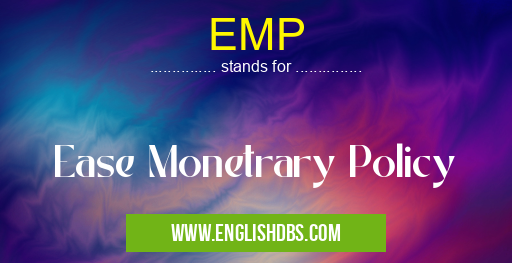What does EMP mean in
EMP is an acronym that stands for Ease Monetary Policy. It refers to a set of actions taken by a central bank to increase the money supply and lower interest rates in order to stimulate economic growth.

EMP meaning in in Governmental
EMP mostly used in an acronym in Category Governmental that means Ease Monetrary Policy
Shorthand: EMP,
Full Form: Ease Monetrary Policy
For more information of "Ease Monetrary Policy", see the section below.
» Governmental »
Purpose of EMP
The primary purpose of EMP is to boost economic activity by:
- Increasing spending: Lower interest rates make it cheaper for businesses to borrow money and invest, leading to increased spending and job creation.
- Promoting borrowing: Reduced interest rates encourage consumers to take on debt for purchases, such as cars and homes, further stimulating demand.
- Supporting asset prices: Lower interest rates make bonds more attractive to investors, leading to higher bond prices and potentially boosting the value of other assets like stocks.
Tools of EMP
Central banks use various tools to implement EMP, including:
- Open market operations: Buying bonds in the open market increases the money supply.
- Lowering interest rates: Reducing the target interest rate makes borrowing cheaper.
- Quantitative easing: Purchasing long-term assets, such as bonds, directly from financial institutions to inject money into the economy.
Effects of EMP
EMP can have both positive and negative effects:
- Positive:
- Stimulates economic growth
- Increases employment
- Raises asset prices
- Negative:
- Can lead to inflation
- Devalues the currency
- May create asset bubbles
Essential Questions and Answers on Ease Monetrary Policy in "GOVERNMENTAL»ECONOMY"
What is Ease Monetary Policy (EMP)?
EMP is a set of measures implemented by a central bank to increase the money supply and lower interest rates, stimulating economic growth.
How does EMP work?
EMP typically involves:
- Purchasing government bonds or other financial assets (known as quantitative easing)
- Lowering interest rates
- Providing liquidity to banks and other financial institutions By increasing the money supply and lowering interest rates, EMP makes it easier for businesses to borrow and invest, and for consumers to spend.
What are the benefits of EMP?
EMP can help:
- Stimulate economic growth
- Reduce unemployment
- Increase inflation to target levels
- Prevent or mitigate economic downturns
What are the risks of EMP?
Potential risks of EMP include:
- Inflation exceeding target levels
- Asset bubbles and financial instability
- Reduced effectiveness over time
- Moral hazard, encouraging excessive risk-taking
When is EMP typically used?
EMP is often used during economic downturns or periods of low inflation. It can also be used to address financial crises or systemic liquidity issues.
Who decides on EMP?
The central bank of a country typically makes decisions on EMP. In the United States, for example, the Federal Reserve is responsible for setting monetary policy.
Are there alternatives to EMP?
Alternative measures to EMP include:
- Fiscal policy (e.g., tax cuts, government spending)
- Structural reforms (e.g., deregulation, labor market reforms)
- Currency devaluation
Final Words: Ease Monetary Policy (EMP) is a powerful tool used by central banks to influence economic activity. By increasing the money supply and lowering interest rates, EMP can stimulate spending, promote borrowing, and support asset prices. However, it is important to carefully consider the potential benefits and risks associated with EMP to achieve optimal economic outcomes.
EMP also stands for: |
|
| All stands for EMP |
